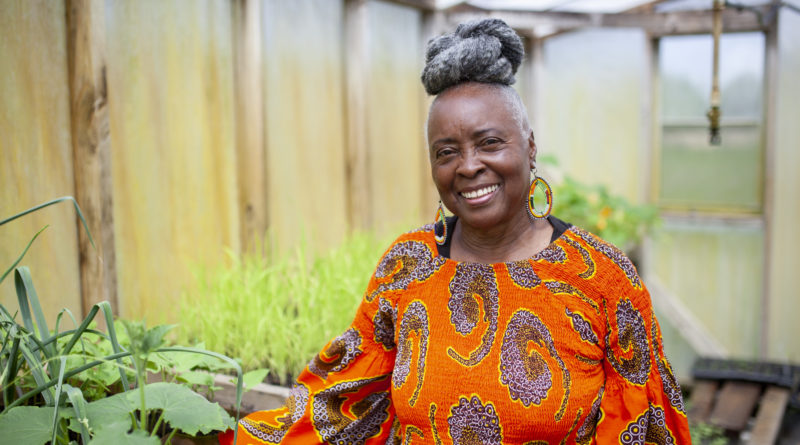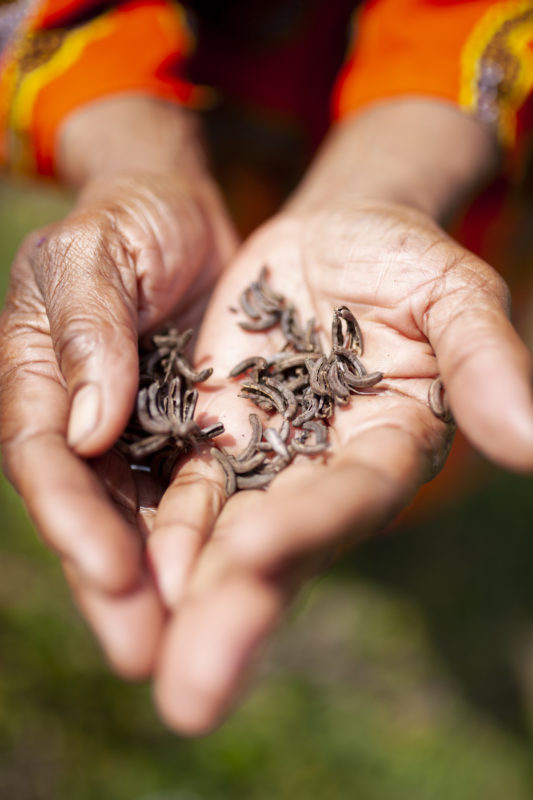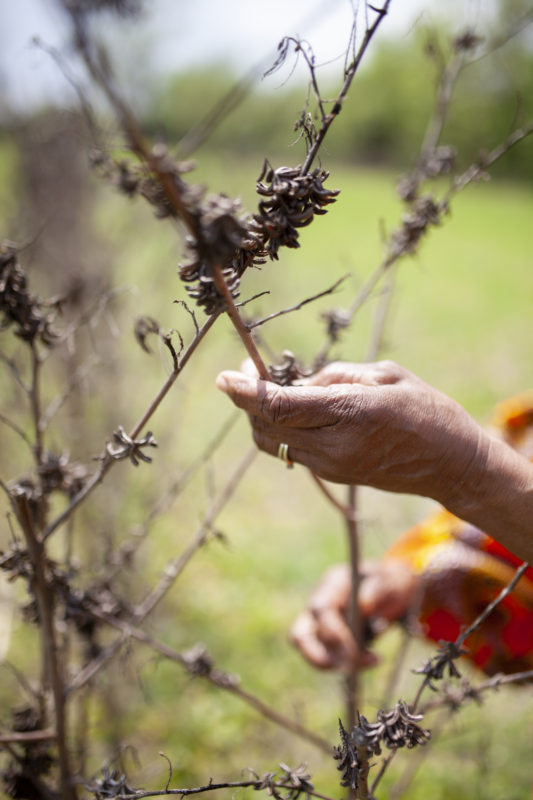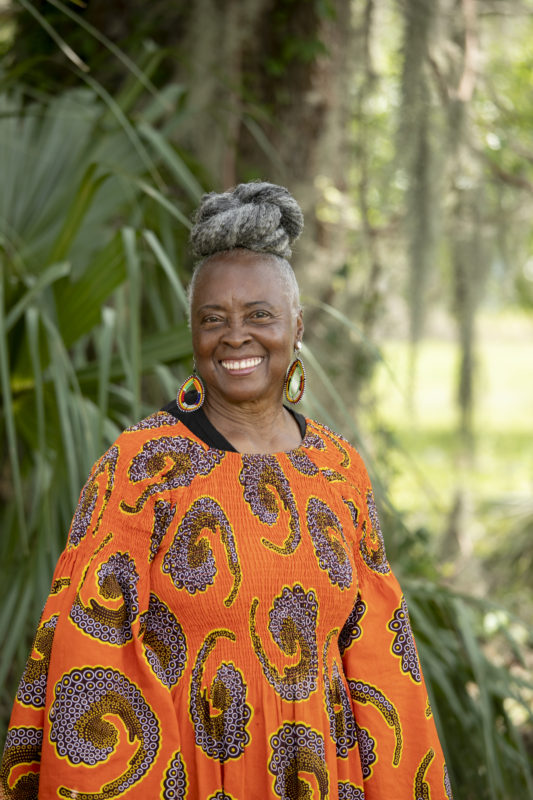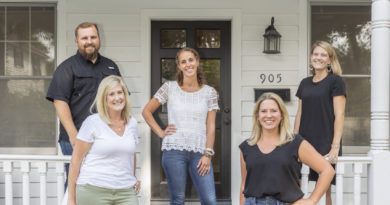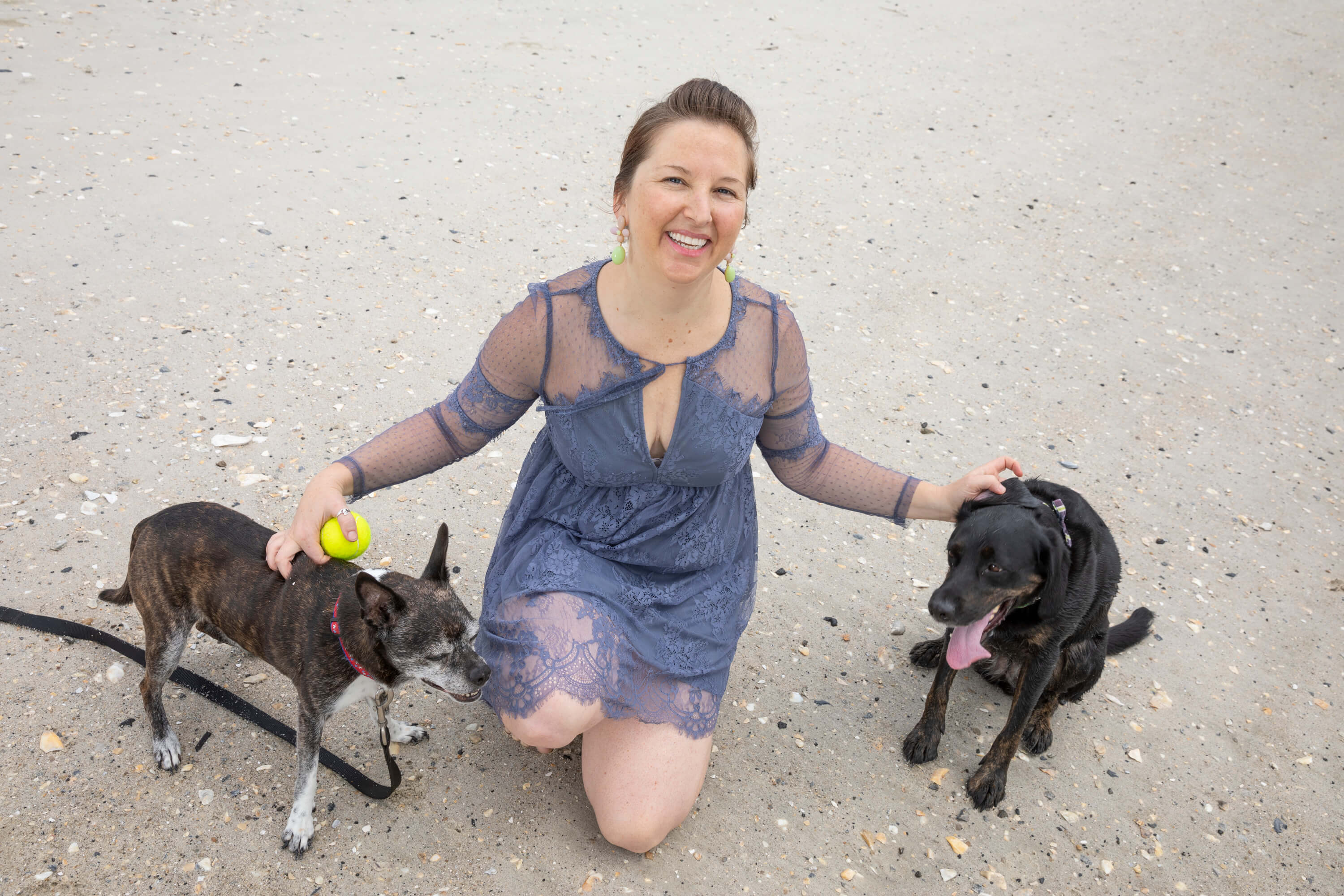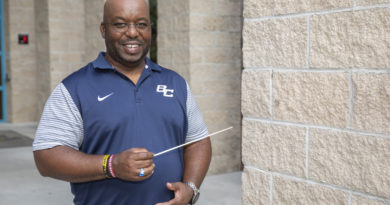Sara Reynolds Green
Sustaining the Gullah Way for Future Generations
story by KATE HAMILTON PARDEE photos by JOHN WOLLWERTH
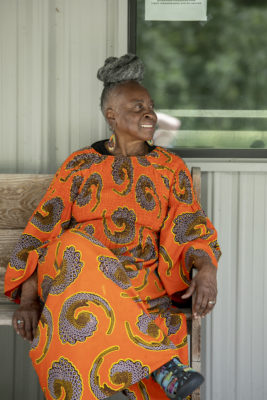 Sitting on the front porch at Marshview Community Organic Farm, one can imagine the ancestors of Sara Reynolds Green, working the sixty-plus acres of land her family purchased generations ago on St. Helena. The farm and its historical roots are now being shaped into projects that will carry on while teaching farming to future generations. It’s Sara Reynolds Green’s present-day legacy to produce innovative, agricultural programs while educating the youth on the ways and beliefs of the Gullah culture.
Sitting on the front porch at Marshview Community Organic Farm, one can imagine the ancestors of Sara Reynolds Green, working the sixty-plus acres of land her family purchased generations ago on St. Helena. The farm and its historical roots are now being shaped into projects that will carry on while teaching farming to future generations. It’s Sara Reynolds Green’s present-day legacy to produce innovative, agricultural programs while educating the youth on the ways and beliefs of the Gullah culture.
Sara’s family farm, where local generational midwife Mrs. Galley Heyward birthed her, was purchased by her maternal great-grandfather Robert Green. “He was an enslaved man and a farmer,” who knew the importance and value of land to save enough to purchase twenty acres in 1865 — “four years out of slavery,” she proudly says. Sara’s parents, David Buster Reynolds and Julia Henderson Reynolds, brought up Sara and her six siblings on this property with extended family members, a traditional Gullah way.
The Gullah culture began here in the Sea Islands. A blending of the various ethnic groups of people brought here from Africa, Sara’s mother was steadfast in her commitment to educating her children on the depth of the Gullah beliefs. “She taught us that you loved yourself and your neighbors,” Sara says. Sara’s days consisted of churchgoing, work on the farm, and school. Sara didn’t enjoy the tasks of being a farmhand and felt limited, and, before long, decided it was time for a new journey to a new place.
After graduating from St. Helena Elementary School and St. Helena High School, Sara received a scholarship to Spellman College in Atlanta, Georgia, to study archeology. “I wanted to know where people came from and their cultures.” Sara soon felt the pursuit of this field was too technical and changed her major to history with a minor in secondary education.
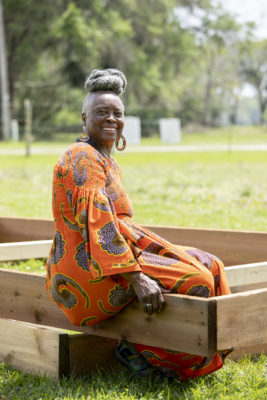 Sara also obtained a master’s degree in School Counseling, helping to increase organic food production and teaching farming entrepreneurship for economic gain to adults and children.
Sara also obtained a master’s degree in School Counseling, helping to increase organic food production and teaching farming entrepreneurship for economic gain to adults and children.
She began her practice teacher tenure in Atlanta, and then moved to a private school and opened Conscious Children’s Center, a daycare facility in Atlanta. Sara’s philosophy was to give children techniques to express themselves in different creative ways while learning their strengths and weaknesses. She added, “Let them be free to explore and hear their hearts speak.”
Sara decided to return home as her mother was getting older, and some family issues regarding land rights needed attention. So, in 1989, Sara returned to the farm where she grew up.
Sara knew she wanted to continue her work with children, teaching the Gullah culture’s values that would include farming. “Being Gullah means being self-reliant, growing vegetables and fruits, and including the elements of nature, such as the ebb and flow of the tides.” Sara wanted to educate the community about her ancestors, who lived in this nourishing environment and grew crops on their land.
Sara’s first community project was organizing some local children to pick up trash. “It would be a beautification project to teach them to be good stewards of the land, and I promised them a barbecue after all their hard work,” Sara shared with a smile. The lesson would be to respect the environment their ancestors had worked so hard to own.
She received professional guidance through the Southeastern African American Organic Farmers Network and worked with the South Carolina Coastal Community Development Corporation (CDC). Sara now found the support to create a not-for-profit agricultural program for children held at her farm.
The Marshview Community Organic Farm, Inc. was beginning. “It would begin with the first seed until the plants were ready to be picked,” Sara explained. We started a Community Supported Agriculture Program (CSA) with twenty members for 14 weeks. Each member purchased a share in the farm’s harvest, and each week we created baskets of fresh produce for each shareholder. Each student also received a percentage of the crop and a stipend each week.
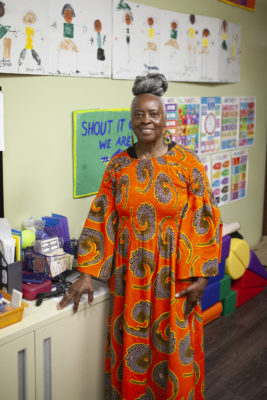 Sara wanted to instill farming skills and emotional lessons in her students that would last a lifetime. “We stressed loving-kindness, peace, patience, and tolerance,” Sara says. These qualities were the core mission, not just harvesting their crops.”
Sara wanted to instill farming skills and emotional lessons in her students that would last a lifetime. “We stressed loving-kindness, peace, patience, and tolerance,” Sara says. These qualities were the core mission, not just harvesting their crops.”
During that time, Sara met a man named Bill Green. He was the manager at the CDC and the chef-owner of the Gullah Grub Restaurant (separate from Sara’s farming program) and located in front of the CDC. Bill noticed Sara during her trips to the CDC to organize her programs. Bill asked one of her friends about her favorite dish to eat. When he learned she didn’t eat red meat, he made a fresh-caught mullet fish preparation, so she wouldn’t have to cook after a long day. “It was delicious,” Sara remembered. He cooked for her again and sealed the deal. They have been married for 12 years and have raised Sara’s son, Maideah, from a previous marriage to the late Dr. Llaila Afrika.
Bill’s Gullah Grub achieved restaurant fame after being featured on the TV show Anthony Bourdain: Parts Unknown. The restaurant is an anchor for the CDC and has a commercial kitchen. Now a team, Sara and Bill decided they would work together using this kitchen and their skillsets to create a cooking program, teaching students to transform their harvest into meals. They started the Gullah Cooking School, using the farm-to-fork strategy as a model while using the Gullah tradition of implementing foods in season. Sara says, “Gullah food is at its best when grown in season and eaten in season. If there is an abundance, the Gullah people knew ways of preserving the food in a healthy and nutritious way.”
The classes taught are sanitation, safety, food preparation, seasoning, knife techniques, and baking. “Most important is how to get along working as a team, and understanding the cycle of food and life in sustainability.” Over 150 students have graduated from the Gullah Cooking School since starting in 2009. Sara shares, “Due to Covid and the hurricanes, we haven’t had a graduation class since 2019 but are seeking funding to resume the programs.”
During the pandemic, Sara and Bill saw an immediate need to feed struggling families, mostly the elderly. They reflected on the words of Maimonides: “If you give a man a fish, he eats for a day. If you teach a man to fish, he eats for a lifetime.” They believe teaching children how to cook these meals is essential to improve overall community health and well-being. Sara and Bill worked with the children in 2020, and 45 delivery drivers prepared, served, and delivered over 45,000 meals. They also partnered with Beaufort Memorial Hospital, preparing 250 hot meals each week distributed to the St. Helena community and New Life Deliverance Temple.
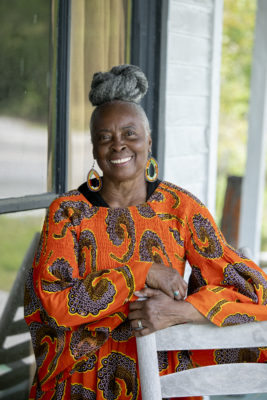 Sara and Bill are grateful for the help in fundraising from the Unitarian Church and the generosity of the California-based Seeds, Soil, and Culture Fund to assist these programs.
Sara and Bill are grateful for the help in fundraising from the Unitarian Church and the generosity of the California-based Seeds, Soil, and Culture Fund to assist these programs.
Starting a nonprofit was new to Sara. “I had other businesses, but running a 501(c)(3) is very different.” Sara continued, “Although important to have good co-workers with the same values and who are passionate, I needed a full business disclosure for all who help or specifically supported the programs. We print an extensive and informational newsletter and make sure we let everyone know how thankful we are for their encouragement, partnership, and resources.”
Although the farm is a priority, future generations need to be educated about Gullah culture and traditions. “These children must know where they came from,” Sara says. “These descendants of ours were not just slaves. They were Kings and Queens in West and Central Africa. They were masters of multiple skills in agriculture, astronomy, engineering, toolmaking, and especially farming rice.” Sara continues, “Upon arrival, they didn’t know how to read or write English, so they improvised, creating a common language they all could learn, which became Gullah. They might have been enslaved, but in their hearts, they always believed they would be free one day.” Sara adds, “Future generations need to know this.”
Betsy Richards, Sara’s long-term friend and dedicated volunteer from Port Royal, says, “It is hard to find words to describe the power and awe of this woman. Sara is a dedicated community activist, helping and improving every facet of the lives of many adults and children with information on planting, growing, and harvesting, all associated with healthy eating. Teaching is Sara’s vocation and avocation, and this community is lucky to have her.”
The old African proverb still guides Sara with its meaningful words: “It takes a whole village to raise a child.” That for Sara includes all the spiritual, mental, physical, and emotional parts.
How promising for this community and those she reaches near and far that this village happens to be close by in St. Helena Island, SC.
For more information, please visit www.marshviewcommunityorganicfarm.com.

